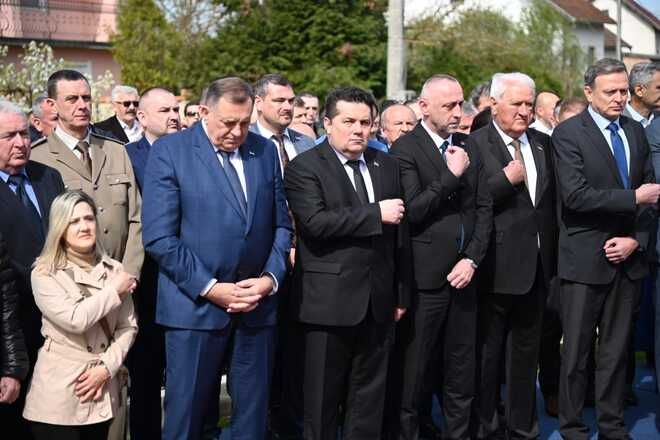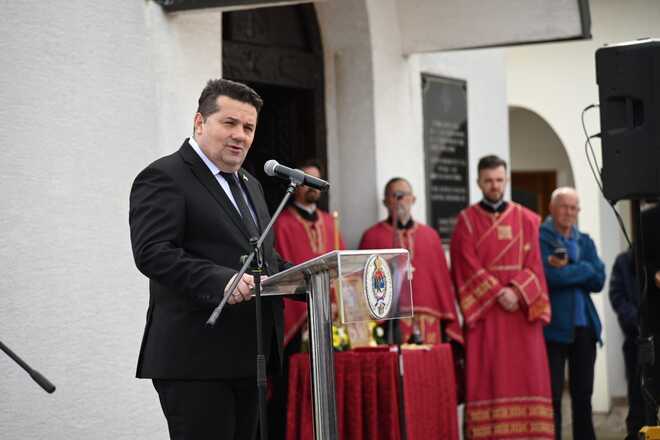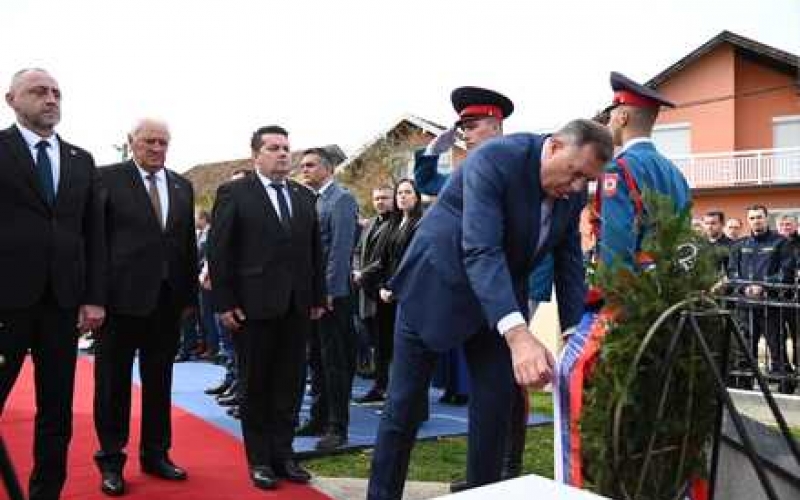President Stevandić attended the commemoration of 32 years since the crime against Serbs in Sijekovac
The President of the National Assembly of the Republic of Srpska, Dr. Nenad Stevandić, attended today in Sijekovac near Brod the commemoration of 32 years since the crimes against Serbs committed by the armed forces from Croatia and paramilitary Muslim-Croat units from Bosnia and Herzegovina.
Together with the President of the Republic of Srpska Milorad Dodik, the envoy of the Serbian member of the BiH Presidency, and the Minister of Labor and Veterans and Disability Protection of the Republic of Srpska Danijelo Egić, he laid a wreath on behalf of the institutions of the Republic of Srpska.
The wreath was laid by the Consul of Serbia in Banja Luka, Dragan Protić. Flowers were laid at the memorial by the delegations of the National Assembly of the Republic of Srpska and the Parliamentary Assembly of Bosnia and Herzegovina, Acting Director of the Republic Center for Research on War, War Crimes and the Search for Missing Persons Viktor Nuždić, representatives of the Serbian people in joint institutions of Bosnia and Herzegovina, delegations from the municipalities of Brod, Vukosavlje, Teslić .
Previously, a memorial service was held for the killed Serbian civilians in the Church of the Holy Great Maria in Sijekovac.
Addressing the audience, Stevandić said that the last century was marked by the attempt to exterminate the Serbian people through world wars and that the war in Bosnia and Herzegovina began in Sijekovci, and with it a new attempt to exterminate.
"But the Serbian people were not erased. Those who were killed are saints, and those who had killed are damned. "Regardless of the lack of remorse or piety on the part of the perpetrators of this crime, we must remember and respect the victims, both here and at other execution sites such as Brod, Jadovno, Jasenovac, Donja Gradina, Garevica, and Prebilovci", pointed out Stevandić.
He said that the Serbian people would neither forget nor forgive this crime and that the Republic of Srpska was created on the knowledge that such crimes would never happen again.
"Our collective consciousness is based on our struggle, state, and country, which has recently been attacked." "Without our collective consciousness, we will not be able to mark such dates, to call our saints and new martyrs for help, and to pray to that greatest army, which in this part of the world no one has either under the earth or in the sky," Stevandić said.
Members of the regular Croatian army, together with paramilitary Croat-Muslim units from BiH and Croatia, killed nine Serb civilians in Sijekovac on March 26, 1992. In the following days, another 37 Serbs from this suburban settlement were killed.
The youngest victim of the brutal crime was 17, and the oldest was 72 years old, while 15 houses and a church were set on fire during the crime spree.
It was the first mass crime even before the armed conflict began in BiH, and it was committed by the regular forces of the Croatian Army and paramilitary Muslim-Croat formations.
The members of the Martić and Dujanić families were killed on March 25, 1992 in Brod, and the next day the massacre took place in Sijekovac.
In the documents of the Brod Veterans Organization, it is stated that 46 Serbian civilians were killed in Sijekovac in 1992.
The occupation by Croatian forces ended on October 7, 1992, when General Slavko Lisica liberated the area of the municipality of Brod with a carefully planned military operation.



